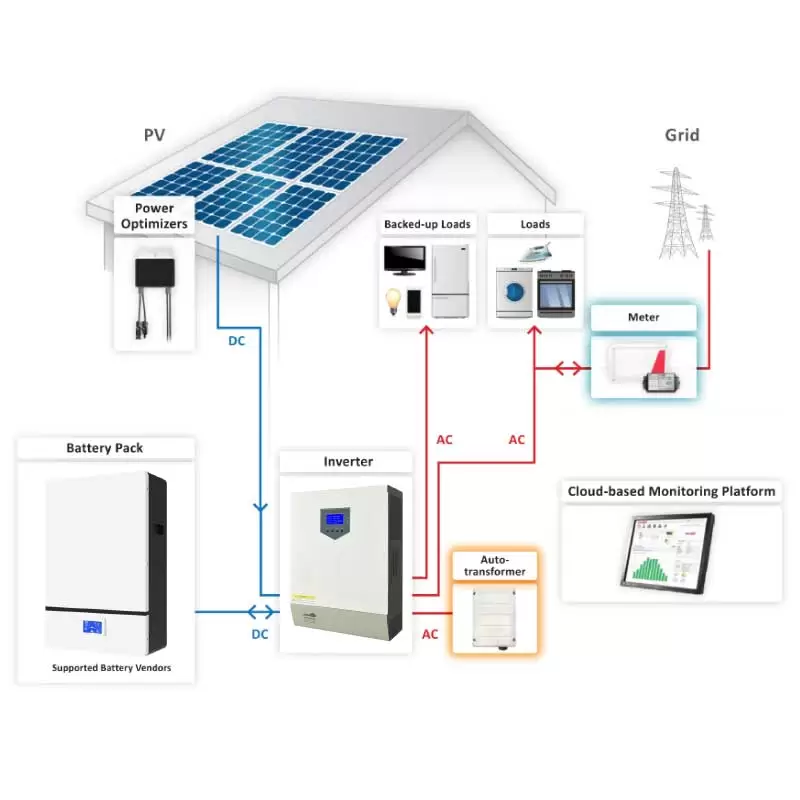Why are lithium batteries important for 8kw Off Grid Solar System?
8kw off grid solar systems are suitable for small and medium-sized families, remote cabins and small businesses, providing them with reliable, self-sufficient power support. One of the cores of its operation is the lithium battery configured in the 8kw off grid solar system, which can store solar energy generated during peak hours during the day for use at night or during long cloudy days. Unlike traditional lead-acid batteries, lithium technology provides higher energy density, longer cycle life and greater depth of discharge. All of these are key factors in maximizing the return on investment of 8kw off-grid solar systems. At the same time, lithium batteries can operate efficiently over a wider temperature range, maintain a stable voltage under load, and support faster charging and discharging speeds, ensuring that power is available when demand surges.
Providing excellent energy density for 8kw off grid solar system
One of the main advantages of using lithium batteries in 8kw off grid solar systems is their excellent energy density. LiFePO₄ or NMC batteries have an energy density of up to 250 Wh/kg, while lead-acid batteries have an energy density of only 40-50 Wh/kg. This means that a 10 kWh lithium battery pack takes up significantly less space and weighs less, making it ideal for residential installations or space-constrained machine rooms. For example, European alpine huts and urban rooftop PV systems benefit from their smaller footprint, making them easier to integrate into existing buildings. The compactness of lithium batteries also simplifies transportation and installation in remote areas, reducing labour and logistics costs. Therefore, an 8kw off-grid solar system equipped with lithium battery energy storage can save valuable living or storage space while maintaining high capacity.

Extending the cycle life of off grid solar systems and reducing life cycle costs
When we design 8kw off grid solar systems, we consider that the total life cycle cost is often more important than the initial purchase capital. The cycle life of lithium batteries at 80% depth of discharge exceeds 5,000 full cycles, while most deep-cycle lead-acid batteries will degrade after only 500-800 cycles at 50% DoD. Over a 15-year service life, the lithium battery pack can easily outperform many lead-acid lithium batteries, saving battery procurement and disposal costs. Additionally, lithium batteries require minimal maintenance – no watering or equalization fees – which further reduces residential user overhead.
In harsh environments, the resiliency and reliability of lithium batteries minimize generator run time and provide stable power delivery. Considering reduced downtime and increased energy availability, the total cost of ownership of an 8kw off-grid solar system equipped with lithium batteries is significantly lower.
Deep discharge depth for maximum usable capacity
Energy storage efficiency is measured not only by total capacity, but also by the percentage of capacity you can safely use. Lithium batteries for 8kw off-grid solar systems can typically support 80-100% depth of discharge without noticeable performance degradation. This deeper discharge capability means that a 10 kWh lithium battery pack can effectively provide 8-10kWh of usable power. In fact, a home relying on an 8kW off-grid solar system can power basic loads (lighting, cooling, water pumps) for longer periods of time during long cloudy days. At the same time, the battery management system ensures that the batteries remain balanced during deep cycling, preventing capacity loss and guaranteeing predictable performance over thousands of cycles.

High charge/discharge efficiency and fast response for 8kw off grid solar systems
In off grid solar systems of any size, every percentage point of efficiency improvement translates into more usable energy and reduced system size requirements. Lithium batteries have a round-trip efficiency of 95% or higher, compared to 80-85% for lead-acid batteries. This means less solar generation is needed to offset losses. This high efficiency reduces the required panel array size and shortens the payback period. In addition, lithium chemistry supports high charge and discharge rates (C-rates), which can quickly charge and instantly supply power during peak sunlight hours to support high starting loads, such as central heating systems. This fast response maintains voltage stability in off-grid conditions, preventing voltage sag when large inductive loads start.
Enhanced safety and thermal management
Safety is critical in any energy storage solution. Lithium batteries significantly reduce the risk of thermal runaway with superior thermal stability and chemical safety. These batteries can withstand higher operating temperatures and prevent overcharging. In contrast, the integrated battery management system continuously monitors key parameters, voltage, temperature, and SOC, providing overcurrent protection, cell balancing, and automatic power-off functions. In tropical or desert locations, a robust thermal management strategy ensures that the battery in an 8kW off-grid solar system operates within an optimal temperature range. This level of safety and monitoring gives installers and end users peace of mind from extreme environments and electrical faults, while also meeting stringent UL and IEC safety standards.
Lithium Batteries: A Key Factor in Reliable Off-Grid Solar Systems
Lithium batteries are key to any high-performance off-grid solar system. Because of their high energy density, longer cycle life to deep discharge depth, excellent efficiency, strong safety features and modular scalability, they directly address the core problems of off grid power supply. By leveraging lithium technology, end users in regions such as South America and Europe can enjoy reliable, cost-effective and environmentally friendly electricity.
